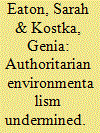| Srl | Item |
| 1 |
ID:
132949


|
|
|
|
|
| Publication |
2014.
|
| Summary/Abstract |
China's national leaders see restructuring and diversification away from resource-based, energy intensive industries as central goals in the coming years. On the basis of extensive fieldwork in China between 2010 and 2012, we suggest that the high turnover of leading cadres at the local level may hinder state-led greening growth initiatives. Frequent cadre turnover is intended primarily to keep local Party secretaries and mayors on the move in order to promote the implementation of central directives. While rotation does seem to aid implementation by reducing coordination problems, there are also significant downsides to local leaders changing office every three to four years. Officials with short time horizons are likely to choose the path of least resistance in selecting quick, low-quality approaches to the implementation of environmental policies. We conclude that the perverse effects of local officials' short time horizons give reason to doubt the more optimistic claims about the advantages of China's model of environmental authoritarianism.
|
|
|
|
|
|
|
|
|
|
|
|
|
|
|
|
| 2 |
ID:
159835


|
|
|
|
|
| Summary/Abstract |
The heavy smog suffocating China's cities is increasingly being perceived as a threat by both the population and the authorities. Consequently, political action aiming at regulating ambient air pollution has become increasingly comprehensive and rigid in recent years. Even measures limiting consumption and production seem to become acceptable as China is facing an airpocalypse. Does this suggest a genesis of real “authoritarian environmentalism” (AE) in China? Taking this as a heuristic point of departure, we present findings from research on the implementation of air pollution control measures in Hangzhou city. We offer a critical examination of the concept of AE and, in particular, of local policy implementation strategies vis-à-vis the general public. Two measures in Hangzhou's air policy portfolio are analysed that reveal considerable variation: restrictions on the use of private cars and the (re)location of industrial facilities. Describing the conditions that have helped to produce different implementation strategies, we argue for different emphases in a potential Chinese model of AE. In a context where outcomes are sought at any cost, we observe more complexity and nuances than are usually captured by the AE concept.
|
|
|
|
|
|
|
|
|
|
|
|
|
|
|
|
| 3 |
ID:
193468


|
|
|
|
|
| Summary/Abstract |
China is the largest contributor to global greening trends over the past two decades, pursuing large-scale tree planting and revegetation initiatives. This type of ecological engineering is controversial, given concerns about China’s authoritarian environmentalism. This essay examines such Chinese efforts and how they diverge from Western environmental approaches based on nature preservation. Chinese environmentalism is based on a tradition that does not delineate nature from culture, the natural from the engineered. This distinction has consequences for global environmental governance in the Anthropocene as China promotes its approach to the global South.
|
|
|
|
|
|
|
|
|
|
|
|
|
|
|
|
| 4 |
ID:
158647


|
|
|
|
|
| Summary/Abstract |
The Indonesian state has issued many regulations to control palm oil expansion, but they have been weakly enforced, resulting in widespread illegal plantations. During the last decade, Indonesian authorities have used force to reduce illegal plantations. This article analyses the drivers behind these actions and questions to what extent they reflect the rise of eco-authoritarianism. By investigating six cases of disciplinary action in Sumatra, we conclude that the Indonesian state is neither practising eco-authoritarianism nor constituting a green state. The disciplinary action, however, has had limited success in environmental terms due to policy incoherence, violent contestation and the sector’s historical context.
|
|
|
|
|
|
|
|
|
|
|
|
|
|
|
|
| 5 |
ID:
183236


|
|
|
|
|
| Summary/Abstract |
This paper explores the perception and politics of air pollution in Shanghai. We present a qualitative case study based on a literature review of relevant policies and research on civil society and air pollution, in dialogue with air quality indexes and field research data. We engage with the concept of China's authoritarian environmentalism and the political context of ecological civilization. We find that discussions about air pollution are often placed in a frame that is both locally temporal (environment) and internationally developmentalist (economy). We raise questions from an example of three applications with different presentations of air quality index measures for the same time and place. This example and frame highlight the central role and connection between technology, data and evidence, and pollution visibility in the case of the perception of air pollution. Our findings then point to two gaps in authoritarian environmentalism research, revealing a need to better understand (1) the role of technology within this governance context, and (2) the tensions created from this non-participatory approach with ecological civilization, which calls for civil society participation.
|
|
|
|
|
|
|
|
|
|
|
|
|
|
|
|